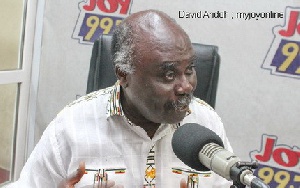Business News of Saturday, 13 June 2015
Source: B&FT
Power too risky for investors
Panelists at the fourth edition of the Ghana Economic Forum (GEF) 2015 say the power sector, as it stands now, is too risky to attract significant private capital to bridge the current generational shortfall of some 700 megawatts and meet future demand.
Foreign exchange, fuel and distribution risks are among the major challenges identified by experts as obstructing investment into the sector.
Dr. Charles Wereko-Brobbey, Chief Policy Analyst, the Ghana Institute for Public Policy Options said: “The micro-economic instability in the country makes it very difficult to pay investors the right tariff for them to make a handsome return on their investment.
“There are 36 companies that have signed PPPs with ECG. The story of not keeping what we promise investors is not good. Transaction time for doing business is also a major problem. A certain amount of quick delivery by government will be very helpful. There is a lack of policy, certainty and integrity in the power sector.
“Government actually sticking to its word is a real problem. Most of these IPPs that have been signed are totally not transparent. Government owes the Electricity Company of Ghana (ECG) about GH¢1.5billion. Who would want to come and invest in the power sector when government’s word cannot be believed? Government’s yes should be yes.”
Kweku Andoh Awotwi, Principal, African Power Systems Management, said there is an incoherent approach in addressing the problems in the power sector.
Mr. Awotwi, who is the immediate past-CEO of VRA said: “We need a much more coherent approach. Ninety percent of the said projects will not see the light of day. We don't plan the approach, and we need to do that. Adhoc approaches will not work, we have to be deliberate. The tariff the regulator gives is not good enough to cover cost of production. The major risks investors face are foreign exchange risk, fuel supply risk, and the risk of default by the Electricity Company of Ghana (ECG)”.
Alex Mould, Ghana national Petroleum Corporation’s Chief Executive added: “ECG is a credit risk. For investors, they look at who the off-taker is and how the off-taker is going to collect money and pay”.
The ECG has over the past years been criticised by power producers for distribution inefficiency and inability to settle its obligation to producers on time, to enable them purchase crude oil for thermal power generation.
In some instances producers have had to rely on local banks for funds, at a significant interest rate, to purchase crude for generation. The power distributor owes the largest power producer, VRA, some GH¢I.5 billion. Sunon-Asogli, the gas-reliant power generator, is also owed a huge amount by the ECG.
Mr. Alex Mould called for outsourcing of the ECG’s distribution and tariff collection. “Outsource ECG, whether to Ghanaians or others, to distribute and collect the tariff. Government should fix the ECG problem.We need a distribution sector that is credible.”
The fourth edition of the Ghana Economic Forum (GEF), which is being organised by the Business and Financial Times (B&FT), is on the theme “Ghanaian-owned economy: setting the agenda for achieving it”. According to the Chief Executive Officer of the Business and Financial Times, Mrs. Edith Dankwa, expectations, recommendations and timelines from the forum will be presented to government in a communiqué to kick-start a five-year running theme that will annually assess the progress made by government and the private sector toward the agenda of a Ghanaian-owned economy.
The Ghana Economic Forum has since its inception set the agenda for public discourse on key issues pertaining to the Ghanaian Economy. Stakeholders at this year’s forum will trade ideas on how Ghanaians can collectively take ownership of the economy and contribute to making it a success.











